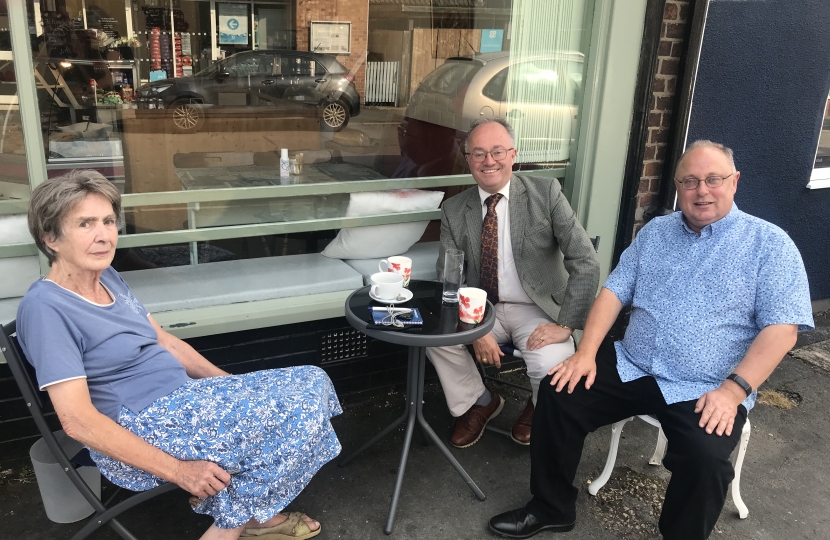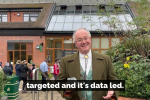
Today I went back to Bottesford, the charming village where I was married and where my wife and I lived for a while.
I was pleased to see that not all that much had changed. The beautiful Church of St Mary’s still dominates the scene as it did when we were married there and when our first child was christened there. The greengrocers is still in Queen Street, along with the chippie and the Co-op. A new arrival was the fine Poppy Seed Café – which had been a baker’s in my day. It was there that I met with the two local councillors who represent the village and surrounding area on Melton Council: Pru Chandler and Don Pritchett.
As I did justice to the Poppy Seed’s excellent Breakfast No.1, I chatted with Pru and Don about policing and crime issues in and around Bottesford. I knew that the old police station had closed a decade ago, though I was not aware that there was now a police presence in the form of a part-time desk at the school. This is good news, but it must be said that I prefer my police presence to be visible. There can be no doubt that the more visible the presence of the police is, the greater the deterrent effect on criminals and the more reassurance there is for the law-abiding. The old Blue Lamp has much to recommend it. I want to see it relit in Bottesford.
One thing that has not changed much is the sense of isolation felt by the good folks of Bottesford. This is a big village, the largest for miles around, but it is a long way from Council headquarters in Melton and even further from the Police HQ just outside Leicester. There is a strong feeling that the village and its surroundings are not really on the police radar in the same way as places closer to Leicester are. Clearly distance can cause problems with police response, but that does not mean that there cannot be a sensible approach to policing here that would deal with the issues that are bothering local residents. It is no good the police turning up on Sunday morning if the problems are on Saturday night. Nor is it much good giving a burglary victim a crime number, and doing nothing more.
As with other villages, the police can plan their visits in consultation with local councillors, such as Pru and Don, but also from talking to the parish council, neighbourhood watch and knowledgeable locals such as pub landlords. Problems in villages such as Bottesford very often occur with predictable regularity. A highly visible police visit at a time when an unruly element is smashing car windows, driving away from pubs over the limit or otherwise causing trouble may or may not catch perpetrators, but it would most certainly calm things down and have a deterrent effect that would ensure a lack of trouble for weeks or months to come. And crimes such as burglary can be tackled with a proactive approach to crime prevention advice, and advice to householders on what they should do if burgled to help the police collect evidence, identify culprits and launch successful prosecutions.
And, as Don pointed out, these problems are only going to get worse. With another 500 houses due to be built on the edge of the village the population is going to go up. An increased population guarantees the viability of much needed services, such as the doctor’s surgery, train station and shops, but it also brings the sort of problems more often associated with small towns than with larger villages. The police are going to need to keep an eye on the changing situation.
I have written elsewhere on this website about the need for a carefully constructed Rural Policing Strategy for Leicestershire and Rutland. I would welcome your input, so please complete my survey about rural policing on https://www.rupertmatthews.org.uk/campaigns/rural-policing-campaign
By this time I had finished my breakfast and had other meetings to go to in the Vale of Belvoir, so I had to bid farewell to Pru and Don. As I went we all agreed that Bottesford is as lovely a place to live as it was when I was there. With a sensible approach to policing the village as its population rises, it should long remain so.

